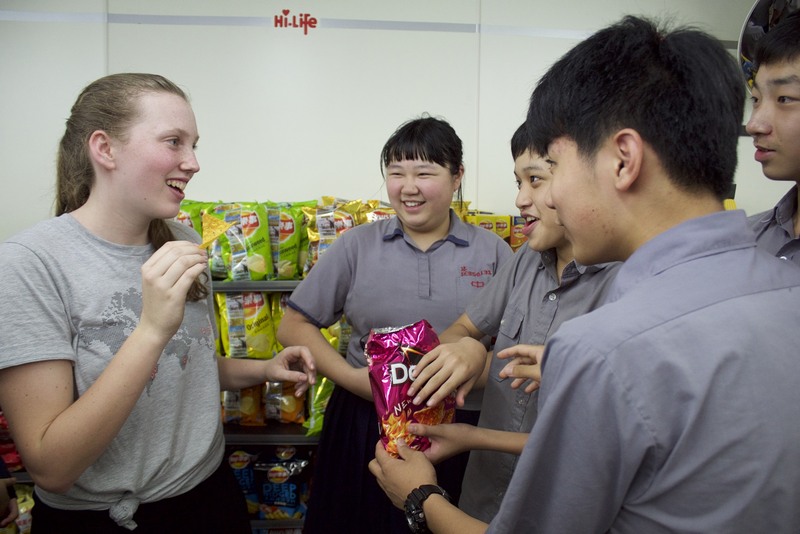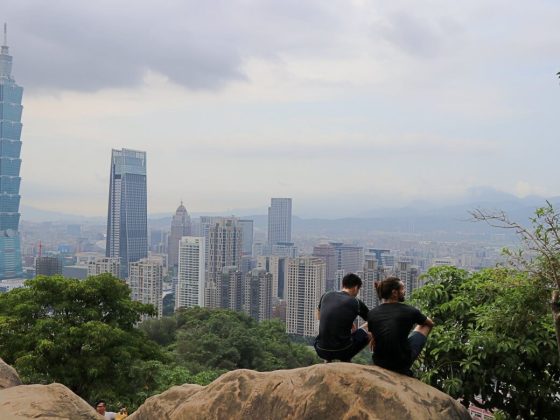Guest Column for Taiwan Scene
by Joseph Vincent, Where There Be Dragons and Grace Jackson, Avenues: The World School
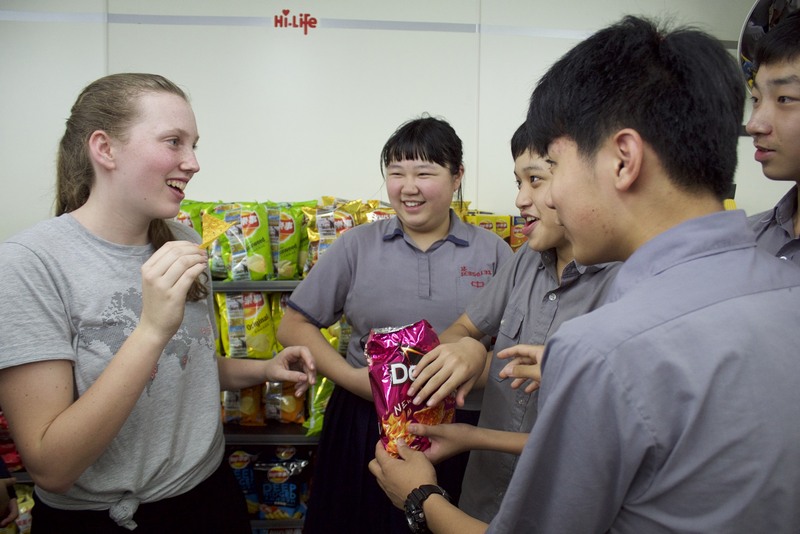
In the Spring of 2017, Where There Be Dragons and Avenues: The World School partnered to bring 15 teenagers from New York City to Taiwan to study sustainability and the environment. Neither Dragons, which has been running international experiential education programs since the early 1990s, nor Avenues, an independent school in New York, had ever run programs in Taiwan before.
Together, we discovered that Taiwan’s unique conditions – the warmth of its diverse people, the coexistence of bustling urbanity and remote wilderness, its relatively small and manageable scale – make it a perfect place for student travel, and in particular, experiential learning.
Our students got a first-hand look at how the environment and environmentalism relate to culture in Taiwan. Their investigations took them around the island, from the metropolis of Taipei to the tiny coastal village of Dulan, from remote Buddhist monasteries to urban recycling centers, tropical permaculture farms to bustling night markets. Along the way, they interacted with a broad cross-section of Taiwanese society, including basketball-obsessed high school students, organic rice farmers, Atayal tribal elders, action-oriented Buddhist nuns, seasoned tour bus tour guides, and activists from the Amei tribe fighting to preserve the integrity of their ancestral lands.
“We had so many great opportunities to engage with locals in Taiwan who are intimately connected with what’s happening in the environment locally and globally,” said Mike Maccarone, a science teacher at Avenues who co-led the program.
As course leaders, our goal was to develop itineraries that would allow students to go deep into particular themes such as climate change and food sustainability while honoring both of our organizations’ missions. One of the missions of Avenues is to inspire students to study abroad, with an emphasis on inspiring them to pursue social impact work in their own communities. Where There Be Dragons values homestay experiences as opportunities for students to deeply engage with off-the-beaten-path communities in order to encourage listening to, learning from and empathizing with people living profoundly different lives from themselves.
Working together, we designed itineraries that bypassed the most popular tourist attractions and sent students into smaller communities where they could build mutually meaningful connections with local people while learning about Taiwan’s environmental movement. For this, there was no better place to start than in the remote mountain village of Zhenxibao.
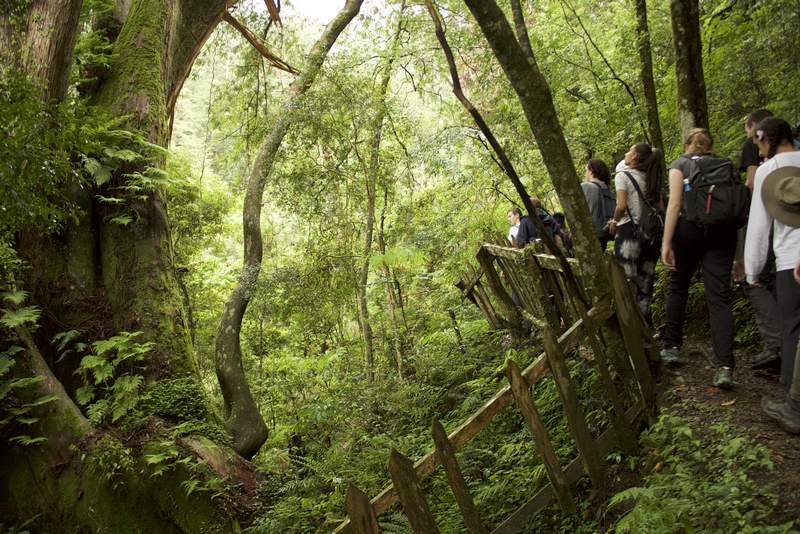
Student homestay in a remote Taiwan village creates lasting memories
It was mid-morning in Zhenxibao, a remote village in Taiwan’s central mountain range, four torturous hours from Hsinchu by minivan (a bus couldn’t handle the switchbacks), and home to the indigenous Atayal tribe. Months before, Joseph (co-author of this article) had visited Zhenxibao to learn more about the community and discuss the possibility of a homestay. Sitting around an old wooden stove with the village elders, he had proposed a plan to bring 15 American students to Zhenxibao to learn about indigenous environmental activism and the community’s stewardship of the nearby old growth forests.
“We’ve never done anything quite like this,” said Zhenxibao resident and community leader Yapit Tali, “but we’d love to give it a try.”
Now the students were finally here, split into groups among three local families, sleeping on hard wooden beds and being put to work on the farm. While the girls had been roasting freshly harvested mushrooms over an open fire and stacking logs with their shushu (“uncle”), a group of boys were helping their Atayal gege (“big brother”) to harvest romaine lettuce and pull weeds.
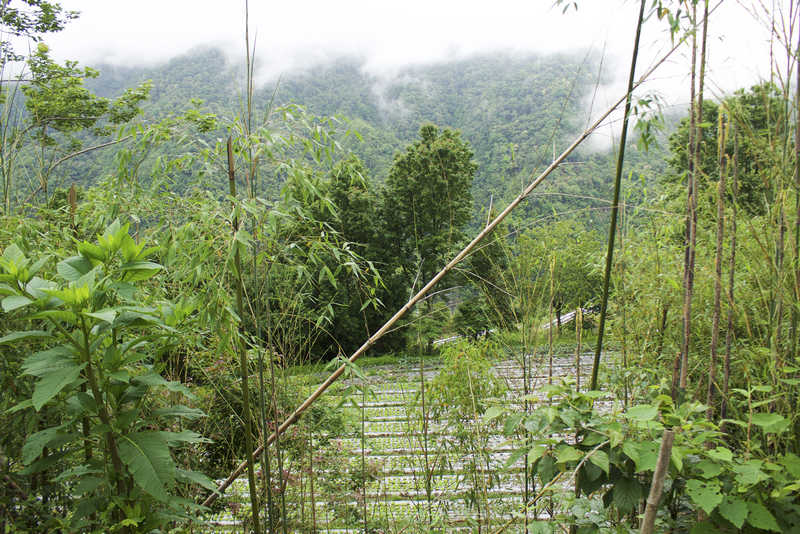
“They’re getting a feel for what it’s like to farm in the open air,” their gege said.
“It’s actually very relaxing,” one student told us, before flinging a fistful of weeds into the woods at the edge of the field.
During an afternoon break, the students enthusiastically regaled us with what they’d done that morning.
“We cut mushrooms and cooked them and ate them,” one student said. “They were so good they didn’t even need seasoning.”
“Our shushu is amazing,” said another. “We helped him stack firewood and taught him a few dance moves.”
“Our lunch consisted of chicken, fish, rice, soup, and our newly harvested chives and cucumbers,” another student said, speaking of the afternoon’s meal. “It was fresh and tasted even more delicious knowing we had contributed to the meal.”
As the sun set behind the clouds on the first day, we looked at each other, relieved that the students’ first day in their homestay had gone well, and just a little surprised that it had gone that well.
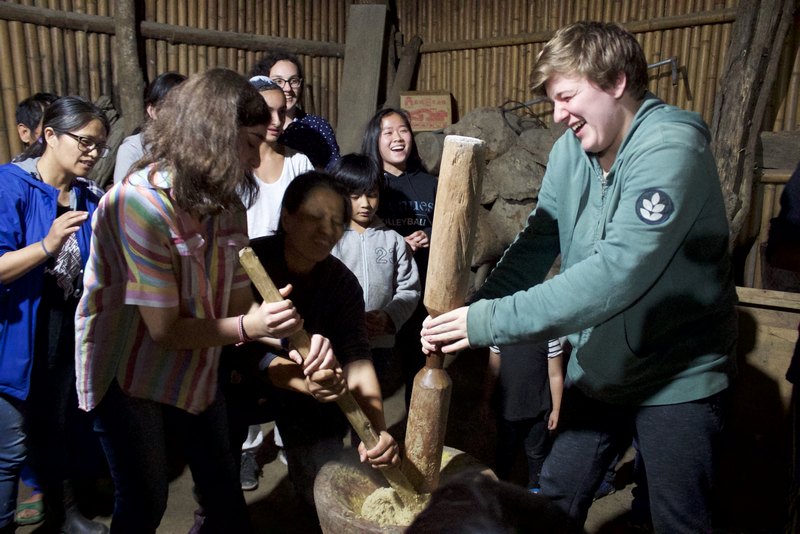
The experience of traveling from bustling Taipei City (where they had wandered in night markets, taken the MRT at rush hour, and discovered the fathomless convenience of 7-Eleven) to this remotest of mountain villages was jarring, a culture shock within a culture shock. But the warmth of our Atayal hosts, their wicked sense of humor and the affection they showed to our students made the transition virtually seamless.
One student explained how her trepidation about living in the home of total strangers for four days vanished when she met her host family. No longer strangers, everyone was instantly mama, baba, shushu, a-yi, gege and jiejie.
After four days of farm work, hiking, and learning about Atayal traditions such as weaving and hunting, the students felt thoroughly at home with their families. On their final evening in Zhenxibao, the community organized a farewell dinner in which each family and group of students prepared a dish to share, from roasted wild boar to scallion pancakes, hotdogs to chive omelets. One student, who made dumplings with her family, remembers the atmosphere as each group arrived for one final meal.
“Like at a dinner party, it seemed that we already knew everyone, and the ‘kids’ (including us) immediately went out into the courtyard to play. For me, it felt like a scene from a movie. Everyone was running around, playing catch, speaking Chinese, or continuing to help with dinner, but everyone was contributing and having fun. Eating dinner together and cracking jokes, it seemed as if we had known each other far longer than four days.”
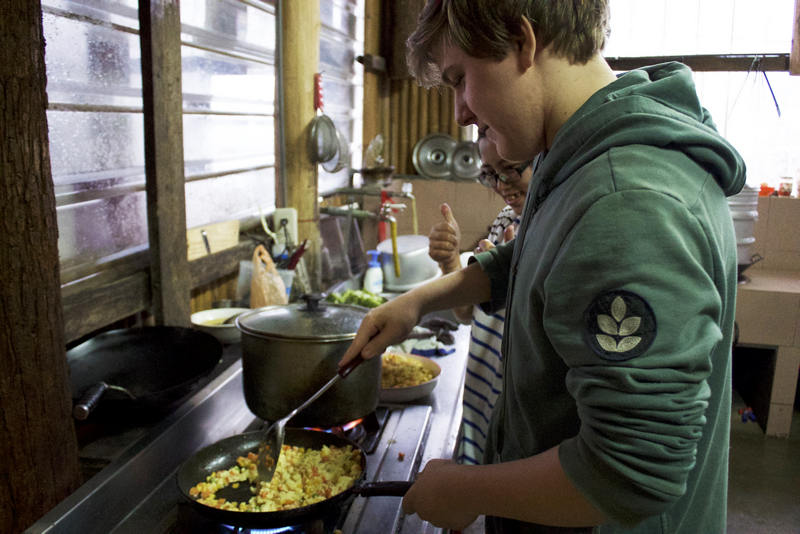
Taiwan tribal homestay experience creates lasting bonds
By forging strong personal relationships with their Atayal hosts, our students also internalized some important lessons about the relationship between human beings and the environment. One student confessed to feeling the impulse to drop a candy wrapper from his hand before considering the beauty and sensitivity of Taiwan’s environment. Having walked among and been awed by the 2,000-year-old cypress trees, which the Atayal people call shen mu (“divine trees”), he had a change of heart.
“I have learned to respect nature. You shouldn’t work against nature, you should work with it,” the student said.
During the farewell ceremony, the village head – known in Mandarin as laodie (literally “old father”) bestowed some parting wisdom on our students, who were gathered around a fire while the cold mountain rain fell quietly outside.
Laodie spoke in his native language, Atayal (he also speaks Japanese and Mandarin). His daughter translated his words, line by line, into Mandarin, which Joseph then translated into English:
“We have the same sun. We have the same mother earth. Let us work together to protect this earth, so that we can breathe well.”
Laodie’s exhortation to protect the earth may not have been novel – a similar message could have been delivered in a classroom or in a documentary film. But in that moment, it landed more powerfully than it ever could elsewhere because the students had come to understand for themselves what was at stake in the fight against climate change. This is a core principle of experiential education, and it’s something that educators around the world are increasingly attempting to harness in their classrooms.
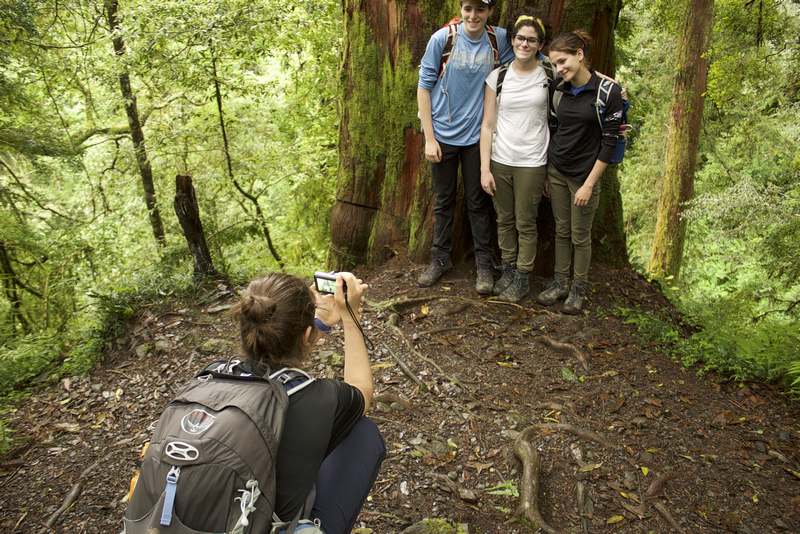
“Putting students in a situation where they’re experiencing something totally new, and experiencing it deeply, and with their peers, and with faculty mentors who can guide them, is the pinnacle of what we mean at Avenues when we talk about interdisciplinary project-based learning,” said teacher Mike Maccarone. “Their experience becomes the classroom, and the classroom becomes their experience, and that overlap allows them to think in a different way.”
The students also experienced unmediated access to nature, a rare thing for New York City teenagers. For some, the beauty of the mountains inspired spiritual reflections. After hiking in the old growth forests near Zhenxibao, one student was moved to poetry:
“Our skyscrapers touch the sky, but the cypress trees touch the heavens.”
Our Atayal hosts were particularly touched by that line and said they would cherish it forever. The students, likewise, would never forget their experiences living with the people of Zhenxibao.
Taiwan’s food provides nourishment – her people create connection
The social and environmental significance of food combined to leave our students with a powerful sense of connection to Taiwan. On a visit to Gangkou Elementary School in Hualien, our students made soup with local children, most of whom were from the Amei tribe.
“The soup was very special because the plants came from the area around the school and we picked hot stones from fire to boil the soup,” one student recalls, “but the most memorable moment of the day was meeting the students because they were very fun to be with.”
As educators, we felt as though we’d hit the jackpot in Taiwan. Where else in the world can you safely expose students to so many different landscapes, languages, cultures, religions, types of food, ways of life in less than 15 days? But it’s impossible to parse Taiwan into a list of experiences without mentioning the magical glue that holds them together, namely the Taiwanese people.
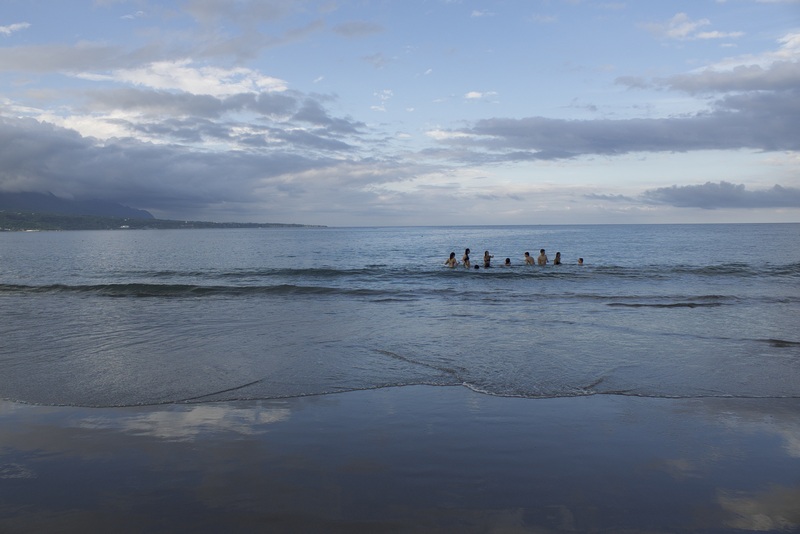
The people we encountered while herding 15 teenagers through the streets of villages, towns and cities of Taiwan were consistently kind to us, curious about us and, with typical Taiwanese modesty, always just a little surprised that we had chosen to come to Taiwan out of all the other places in the world. After our experience, we’re surprised that anyone would ever go anywhere else.
Food was another point of connection for our students, who sampled the full range of Taiwan’s culinary offerings: mock meat at vegetarian Buddhist restaurants, oyster omelet flavored chips from 7-Eleven, pot stickers from reliable chain restaurant Bafang Yunji, fresh cut mangoes from roadside fruit stands, almost daily bubble teas, and the obligatory stinky tofu.
The students had mixed verdicts on this uniquely “Taiwanese” favorite.
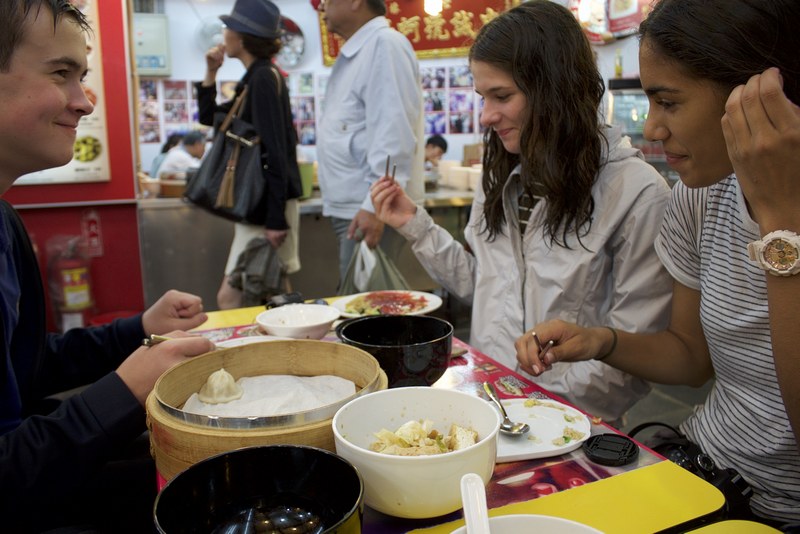
Our local tour guide, a bubbly middle-aged woman named Xiuxiu, was mindful of the students’ diets.
“I was worried that they wouldn’t be used to Taiwanese food or be able to use chopsticks, but it wasn’t a problem in the end,” Xiuxiu said. “The students enjoyed learning how to wrap rice balls during Dragon Boat Festival, ate danzai noodles in Tainan, had beef noodle soup in Taitung, and made mantou (steamed buns), dumplings and even pizza in Yilan.”
By the program’s end, the students had grown quite fond of Xiuxiu, with a couple refusing to let go of her hand when saying goodbye at Taoyuan airport. When they finally did, they left her reluctantly, and with parting words in Mandarin:
Wo ai ni. (I love you)
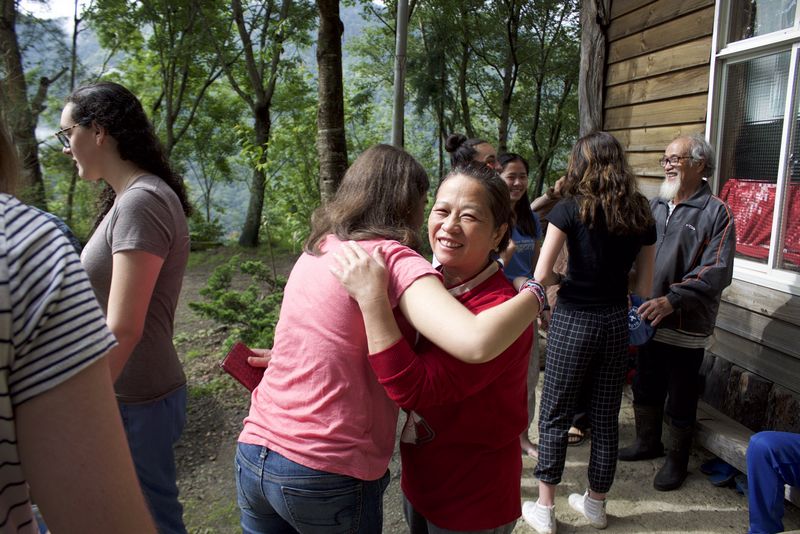
Check out this video created by the authors during their epic Taiwan journey!
[youtube https://www.youtube.com/watch?v=T7ssVi2DfS4&w=560&h=315]About the Authors:
Joseph Vincent fell in love with Taiwan for the first time while studying at Jingwen High School in Taipei as a Rotary exchange student at the age of 16. Since then, he has returned countless times as a traveler, educator, translator, and most recently master’s student in the Department of Chinese Literature at National Taiwan University, where he graduated in 2017. To get in touch with Joseph about experiential education in Taiwan or Where There Be Dragons programs, email [email protected].
Grace Jackson is a British writer, videographer, and educator based in New York. Grace lived in Taiwan for two years before gaining a master’s degree in East Asian Studies (with a focus on Chinese history) at Harvard University, where she was a Frank Knox Fellow. She currently works on the Creative Team at Avenues: The World School, and has led several study abroad programs for high school students in Asia, including two in partnership with Where There Be Dragons.
You might also be interested in: Just Passing Through: 5 Taiwan Urban Layovers

